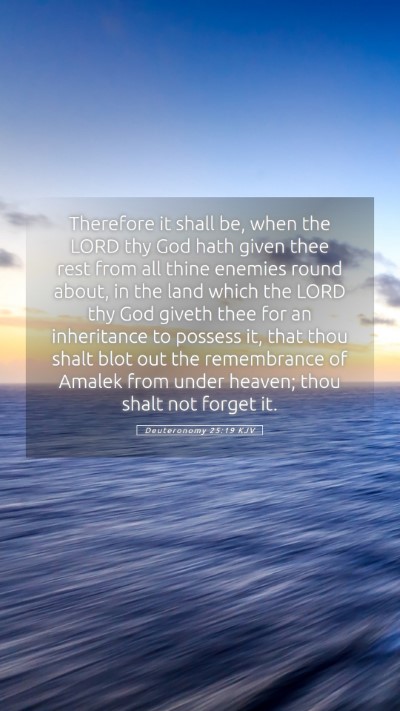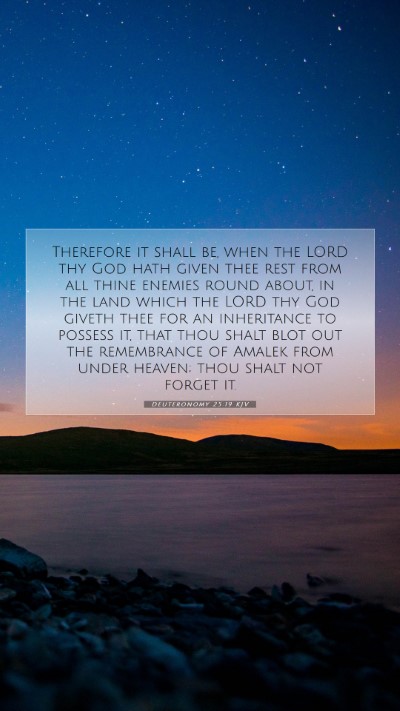Understanding Deuteronomy 25:19: A Comprehensive Bible Verse Explanation
Deuteronomy 25:19 states:
"Therefore it shall be, when the LORD your God has given you rest from your enemies all around, in the land which the LORD your God is giving you to possess as an inheritance, that you will blot out the remembrance of Amalek from under heaven. You shall not forget."
This verse is part of a larger narrative within the book of Deuteronomy, which is known for outlining laws and commandments for the Israelites. The significance of this verse can be distilled through various commentaries, providing deep biblical verse meanings and interpretations.
Contextual Background
In this passage, Moses is addressing the Israelites before they enter the Promised Land. The reference to Amalek recalls a historical conflict where the Amalekites attacked the Israelites during their exodus from Egypt (see Exodus 17:8-16). The command to "blot out the remembrance of Amalek" signifies God's judgment against those who oppose His people.
Biblical Commentary Insights
-
Matthew Henry's Commentary:
Henry emphasizes the moral obligation to remember the past conflicts and to seek justice against those who would harm God's people. He notes that "forgetting" in this context indicates a failure to uphold God’s justice and a danger to the communal faith.
-
Albert Barnes' Notes on the Bible:
Barnes points out that the Amalekites symbolize opposition to God’s purposes. The commandment serves not just as historical recollection but as an ongoing principle for God's people—removing any trace of sin or opposition to divine will from their lives.
-
Adam Clarke's Commentary:
Clarke elaborates on the implications of the verse, indicating that it reflects God's intention for Israel's purity and exclusivity in worship. He asserts that it highlights the importance of maintaining a distinct identity as God's chosen people.
Significance of the Commandment
The command to remember Amalek relates to broader themes of divine justice and human obedience. It calls for vigilance against moral decay and the actions of those who oppose God. This is significant not only historically for Israel but also in terms of biblical theology.
Application to Daily Life
The verse encourages reflection on how history informs faith. In contemporary application, believers can consider what "Amalek" represents in their lives—anything that undermines faithfulness to God. It serves as an exhortation to engage actively in spiritual disciplines that encourage remembrance of God's faithfulness and justice.
Related Bible Verses
- Exodus 17:14-16: "Then the LORD said to Moses, 'Write this for a memorial in the book and recite it in the hearing of Joshua, that I will utterly blot out the remembrance of Amalek from under heaven.'"
- 1 Samuel 15:2-3: "Thus says the LORD of hosts, 'I remember what Amalek did to Israel, how he ambushed him on the way as he was coming up from Egypt...now go and attack Amalek...'"
- Psalms 34:16: "The face of the LORD is against those who do evil, to cut off the memory of them from the earth."
Conclusion
Deuteronomy 25:19 serves as an essential reminder of God’s justice and the importance of remembering our spiritual history. Through the insights provided by various biblical commentaries, one can gain a profound understanding of Scripture. Whether you are engaged in Bible study groups, online Bible studies, or personal devotionals, reflecting on such verses equips believers with the tools needed for a deeper faith.


